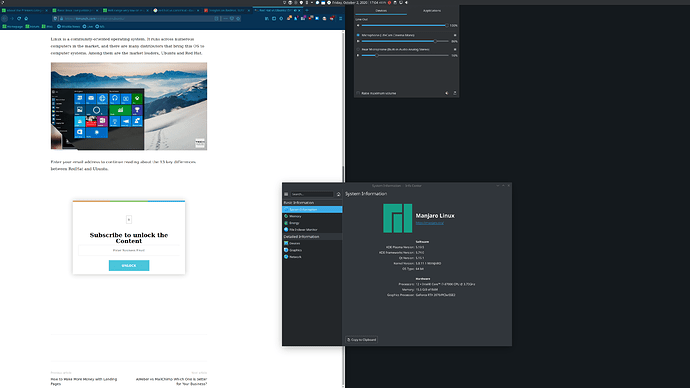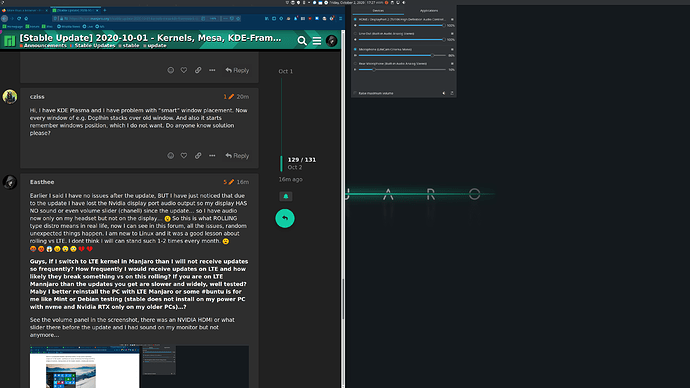is not a bug in the dhcpcd package?
https://bbs.archlinux.org/viewtopic.php?id=258877
after the update I still have the system without sound, and now when starting with the 5.8.11-1 kernel o after a few minutes the system freezes completely being forced to restart by the button
KDE Plasma Version: 5.19.5
KDE Frameworks Version: 5.74.0
Qt Version: 5.15.1
Kernel Version: 5.8.11-1-MANJARO
All good here, so far.
I don’t use any extra KDE Widgets - so I suspect that helps.
Ic þancie þē
The update worked very well in all areas: Gnome 3.36, Kernel 5.8.11-1.
Thank you and have a nice weekend.
I am having the same problem with a black screen after login however in my case it was the Archlinux AUR plasma5-applets-plasma-pstate package plasma widget that was causing problems.
Interestingly I have this installed on 2 laptops, one with only an Intel GPU (integrated with the CPU) and another that is using optimus hybrid nvidia blob, i.e.
<~>-> mhwd -li
> Installed PCI configs:
--------------------------------------------------------------------------------
NAME VERSION FREEDRIVER TYPE
--------------------------------------------------------------------------------
video-hybrid-intel-nvidia-440xx-prime 2019.10.25 false PCI
Warning: No installed USB configs!
If the package plasma5-applets-plasma-pstate is installed then I have the black screen after login problem. Seems like there is an issue with certain plasma widgets on the newest KDE release, reported upstream at plasma-pstate widget causing plasmashell to crash in latest manjaro stable · Issue #63 · jsalatas/plasma-pstate · GitHub.
Everything went well but i am receiving a few inotify_add_watch permission denied errors in my log after journalctl -b -p err..alert.
I notice that 40-max_user_watches.conf no longer exists but 50-max_user_watches.conf is set at 16384.
I’m wondering if the 16384 not being 524288 is the cause of the errors (i am a newb tho).
As far as i can tell it is only log spam 
5.8/440 KDE
At 4am local time, I updated my machines. I run KDE with three database servers running at all times. No problems. I started the download from Pamac, let Pamac deal with the download, made my coffee, walked the dog, rebooted, and all is fine.
Thank you to philm and crew!
Got that dhcpcd warning in Testing update [2020-09-10] and Stable update [2020-09-11].
Even if we set the permissions to 755, it will revert back to 700 after the next reboot. So it’s probably a bug as you mentioned.
Cinnamon 5.4, update went well as usual. Thanks again for a great OS and great maintenance.
Hi, I have KDE Plasma and I have problem with “smart” window placement. Now every window of e.g. Doplhin stacks over old window. And also it starts remember windows position, which I do not want. Do anyone know solution please?
Earlier I said I have no issues after the update, BUT I have just noticed that due to the update I have lost the Nvidia display port audio output so my display HAS NO sound or even volume slider (chanell) since the update… so I have audio now only on my headset but not on the display…  So this is what ROLLING type distro means in real life, now I can see in this forum, all the issues, random unexpected things happen. I am new to Linux and it was a good lesson about rolling vs LTE. I dont think I will can stand such 1-2 times every month.
So this is what ROLLING type distro means in real life, now I can see in this forum, all the issues, random unexpected things happen. I am new to Linux and it was a good lesson about rolling vs LTE. I dont think I will can stand such 1-2 times every month. 








Guys, if I switch to LTE kernel in Manjaro than I will not receive updates so frequently? How frequently I would receive updates on LTE and how likely they break something vs on this rolling? If you are on LTE Mannjaro than the updates you get are slower and widely, well tested? Maby I better reinstall the PC with LTE Manjaro or some #buntu is for me like Mint or Debian testing (stable does not install on my power PC with nvme and Nvidia RTX only on my older PCs)…?
See the volume panel in the screenshot, there was an NVIDIA HDMI or what slider there before the update and I had sound on my monitor but not anymore…
[x@x1 ~]$ inxi -Fxza
System:
Kernel: 5.8.11-1-MANJARO x86_64 bits: 64 compiler: N/A
parameters: BOOT_IMAGE=/@/boot/vmlinuz-5.8-x86_64
root=UUID=cf4c01eb-7117-4d41-ba2a-6d4e44ba60a4 rw rootflags=subvol=@ quiet
apparmor=1 security=apparmor udev.log_priority=3
Desktop: KDE Plasma 5.19.5 tk: Qt 5.15.1 wm: kwin_x11 dm: SDDM
Distro: Manjaro Linux
Machine:
Type: Desktop System: Gigabyte product: Z370M D3H v: N/A serial: <filter>
Mobo: Gigabyte model: Z370M D3H-CF v: x.x serial: <filter>
UEFI: American Megatrends v: F13 date: 08/13/2019
CPU:
Topology: 6-Core model: Intel Core i7-8700K bits: 64 type: MT MCP arch: Kaby Lake
family: 6 model-id: 9E (158) stepping: A (10) microcode: D6 L2 cache: 12.0 MiB
flags: avx avx2 lm nx pae sse sse2 sse3 sse4_1 sse4_2 ssse3 vmx bogomips: 88824
Speed: 800 MHz min/max: 800/4700 MHz Core speeds (MHz): 1: 800 2: 801 3: 800
4: 800 5: 800 6: 800 7: 800 8: 800 9: 800 10: 800 11: 800 12: 800
Vulnerabilities: Type: itlb_multihit status: KVM: VMX disabled
Type: l1tf
mitigation: PTE Inversion; VMX: conditional cache flushes, SMT vulnerable
Type: mds mitigation: Clear CPU buffers; SMT vulnerable
Type: meltdown mitigation: PTI
Type: spec_store_bypass
mitigation: Speculative Store Bypass disabled via prctl and seccomp
Type: spectre_v1
mitigation: usercopy/swapgs barriers and __user pointer sanitization
Type: spectre_v2 mitigation: Full generic retpoline, IBPB: conditional, IBRS_FW,
STIBP: conditional, RSB filling
Type: srbds mitigation: Microcode
Type: tsx_async_abort mitigation: Clear CPU buffers; SMT vulnerable
Graphics:
Device-1: NVIDIA TU106 [GeForce RTX 2070] vendor: Micro-Star MSI driver: nvidia
v: 450.66 alternate: nouveau,nvidia_drm bus ID: 01:00.0 chip ID: 10de:1f02
Display: x11 server: X.Org 1.20.9 compositor: kwin_x11 driver: nvidia
display ID: :0 screens: 1
Screen-1: 0 s-res: 3840x2160 s-dpi: 110 s-size: 887x494mm (34.9x19.4")
s-diag: 1015mm (40")
Monitor-1: DP-2 res: 3840x2160 hz: 60 dpi: 111 size: 878x485mm (34.6x19.1")
diag: 1003mm (39.5")
OpenGL: renderer: GeForce RTX 2070/PCIe/SSE2 v: 4.6.0 NVIDIA 450.66
direct render: Yes
Audio:
Device-1: Intel 200 Series PCH HD Audio vendor: Gigabyte driver: snd_hda_intel
v: kernel bus ID: 00:1f.3 chip ID: 8086:a2f0
Device-2: NVIDIA TU106 High Definition Audio vendor: Micro-Star MSI
driver: snd_hda_intel v: kernel bus ID: 01:00.1 chip ID: 10de:10f9
Device-3: Microsoft LifeCam Cinema type: USB driver: snd-usb-audio bus ID: 1-1:2
chip ID: 045e:075d
Sound Server: ALSA v: k5.8.11-1-MANJARO
Network:
Device-1: Intel Ethernet I219-V vendor: Gigabyte driver: e1000e v: 3.2.6-k
port: f000 bus ID: 00:1f.6 chip ID: 8086:15b8
IF: eno1 state: up speed: 100 Mbps duplex: full mac: <filter>
Drives:
Local Storage: total: 1.14 TiB used: 39.71 GiB (3.4%)
SMART Message: Unable to run smartctl. Root privileges required.
ID-1: /dev/nvme0n1 vendor: Samsung model: MZVPW256HEGL-000H1 size: 238.47 GiB
block size: physical: 512 B logical: 512 B speed: 31.6 Gb/s lanes: 4
serial: <filter> rev: CXZ73H0Q scheme: GPT
ID-2: /dev/sda vendor: Western Digital model: WD10EFRX-68FYTN0 size: 931.51 GiB
block size: physical: 4096 B logical: 512 B speed: 6.0 Gb/s rotation: 5400 rpm
serial: <filter> rev: 0A82 scheme: GPT
Partition:
ID-1: / raw size: 237.97 GiB size: 237.97 GiB (100.00%) used: 24.12 GiB (10.1%)
fs: btrfs dev: /dev/nvme0n1p2
ID-2: /home raw size: 237.97 GiB size: 237.97 GiB (100.00%)
used: 24.12 GiB (10.1%) fs: btrfs dev: /dev/nvme0n1p2
Swap:
Alert: No Swap data was found.
Sensors:
System Temperatures: cpu: 27.8 C mobo: 16.8 C gpu: nvidia temp: 32 C
Fan Speeds (RPM): N/A gpu: nvidia fan: 46%
Info:
Processes: 337 Uptime: 1h 15m Memory: 15.58 GiB used: 2.57 GiB (16.5%)
Init: systemd v: 246 Compilers: gcc: 10.2.0 Packages: 1212 pacman: 1203 lib: 321
flatpak: 9 Shell: Bash v: 5.0.18 running in: yakuake inxi: 3.1.05
UPDATE:
Since I updated this PC yesterday night I didnt make any changes, it was mainly off. Now when I booted up and noticed this audio issue and left this post, so after that I rebooted and now the audio issue is just gone, the HDMI output slider is back! Just so, randomly! But at the same time I feel like the PC automatically or randomly or so returned to some earlier state…? Becaue I had like 5+ open tabs in Firedox before reboot but after reboot it opened with just 2 tabs an ddifferent ones than I had open before reboot…
What the heck is going on on this PC…? It is like I have zero control on it.
To get Plasma to stop remembering window placements by default:
Edit the file: ~⁄.config⁄kdeglobals
Under the [General] heading, add the following line:
AllowKDEAppsToRememberWindowPositions=false
Save. I think you’ll have to logout for it to take effect.
LTS only relates to the kernel updates.
The branches (testing/stable etc) relate to the software updates and generally stable releases every week or two (maybe slower if major updates are coming).
The beauty of rolling distros over things like ubuntu is that bug fixes also happen quicker.
I’d suggest opening a thread with any major issues you have (that are not shown in the update threads) as there are a lot of wise users here.
Glad the slider is back.
I cant explain the tabs though firefox did just get a version update from 80 to 81…
Did you reboot between your system update and your first issue post?
Yes I did. I ran the update yesterday night and it went smoothly, than first thing I did reboot straight after the install has finished (to make sure all fine). Than used the PC night time here to talk on forum and than did shut it down normally. Booted in the morning for 20mi use and did shut it down again normally. And here we are after my today evening boot I noticed this audio issue. I have not used Timeshift after or until the update.
Everything seems fine after upgrade, but I’ve noticed following:
UNIT LOAD ACTIVE SUB DESCRIPTION
● user@120.service loaded failed failed User Manager for UID 120
Any ideas?
How do I revert back? It’s breaking some applications for me, to be specific optimus-manager-qt. PLease help!
I have the same issue (have had it for a few months now but I haven’t found the exact cause yet. What I have found is that if I manually restart the service after my system is up is starts up just fine. I didn’t get any response last time I posted about it though here on the forums and google went all kinds of directions with it that none led me to an actual solution more just people asking about it.
sytemctl start user@120.service
will start it up without any issues for me but why it is failing initially I have no idea.
I’ve found that it is a special service and it sounds like it might be important but everything has worked fine with it failing for months now.
https://www.freedesktop.org/software/systemd/man/user@.service.html
Searches for my specific error in the log only came up with this from a couple years ago and had no solution.
https://bbs.archlinux.org/viewtopic.php?id=238673
Thx! This solution works! But I think, that this must be some bug, because before it works fine.

